
This is a story about human carnivores—people who believe that the best diet is one composed only of meat. No bread or potatoes. No salads. Definitely no kale. Just animal flesh. Or, in the case of the infamous Canadian psychologist Jordan B. Peterson and his daughter, Mikhaila, just beef, salt, water, and the occasional glass of bourbon.
“I know how ridiculous it sounds,” Mikhaila says. But that’s how the carnivore diet began, with people like her concluding that the standard nutritional advice wasn’t working for them. Mikhaila now credits her all-meat diet with easing her debilitating autoimmune conditions, fatigue, and depression. Her father, too, claims he has lost more than 45 pounds since he began following his daughter’s lead. He says he now feels magnificent, even if the diet is “dull as hell,” and he has turned into a vocal supporter of the plan.
When you mention this meat-only diet to an omnivore or herbivore, their reactions tend to fall somewhere between disbelief and anger. And understandably so: Your hogwash-o-meter is on high alert when it comes to celebrity-endorsed miracle cures, and Jordan Peterson’s “cow plan” sounds like the bullshit bull’s-eye. After all, if vegans are associated in the popular imagination with environmentalism, progressive causes, the Left, and compassion, carnivores must surely stand for the opposite, right?
It sounds like a parody diet for climate-change-denying, coal-rolling, gun-toting, toxically masculine (ahem) meatheads. Such is the age we live in—nothing just stands for itself. And so, in a weird way, this is also a story about science and ideology, carbs and fat, and the ever-fuzzy line between healthy skepticism and conspiracy theory.
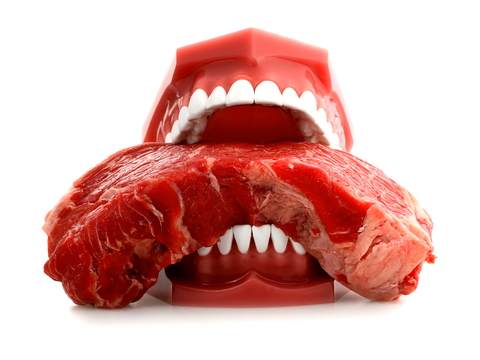
THEPALMERGetty Images
The Carnivores Rise
If there’s one guy who personifies the meat-only lifestyle, it’s Shawn Baker, a 52-year-old former orthopedic surgeon based in Albuquerque. He’s a beast—a six-foot-five rugby-playing powerlifter who eats about four pounds of steak per day. Through his commitment to eating carnivore, Baker has become something of a leader for the nutritionally disenchanted. Profanity-studded, pro-meat screeds are common across his social-media accounts.
“Those who were going carnivore ten years ago did so because they’d been chronically sick,” he says. “They had been vegetarian and vegan. They had been on all kinds of medication. This was the only thing that worked for them.” Baker sells books and diet plans to would-be carnivores. He’s ripped like a cartoon henchman. Maybe that’s why people are listening, despite the fact that he lost his medical license in 2017 due to incompetence and for “failing to report an adverse action,” according to the New Mexico Medical Board. Baker, to his credit, does say that a meat-only diet is not for everyone and stresses that those who are interested in trying it should do their own research.
Intriguingly, some of these carnivore-diet followers report that they used to be vegan, having tried various food-elimination regimens to address an illness or persistent weight gain.
What’s helping this meat tribe bond is the Internet, the destination where people with niche interests usually find one another. A computer scientist named L. Amber O’Hearn blogs extensively about the subject at empiri.ca. Her tagline is “Eat meat. Not too little. Mostly fat.” (It’s a nice spin on Michael Pollan’s advice from his 2008 book, In Defense of Food: “Eat food. Not too much. Mostly plants.”) But where the carnivore community really comes together is on Reddit, with forums like /r/zerocarb (which has around 84,000 subscribers) and/r/carnivore (6,900 subscribers).
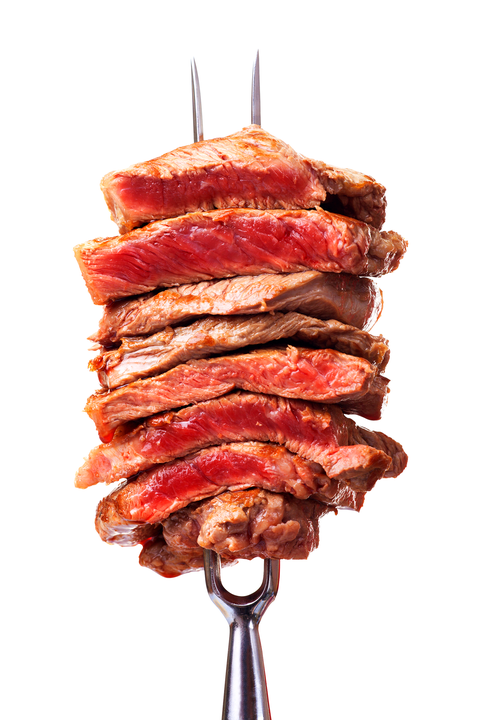
bernjuerGetty Images
On these message boards, the carnivorous help each other troubleshoot issues like constipation and proper hydration, as well as share success stories about losing weight and overcoming irritable bowel syndrome. Intriguingly, some of these carnivore-diet followers report that they used to be vegan, having tried various food-elimination regimens to address an illness or persistent weight gain.
“Carnivore diet” was also one of the top diet searches of 2018, according to Google search reports, and the term started trending last summer after Jordan Peterson appeared on the Joe Rogan Experience podcast. One listener was Luke Irving, 29, an /r/zerocarb member, swim instructor, and former personal trainer. “Before going carnivore, I considered myself relatively healthy,” he says. “I would work out a lot and eat a diverse range of whole grains, vegetables, fruit, and lean cuts of meat. I basically flipped my old way of eating upside down.”
Irving says hearing Peterson’s story sparked his interest in the carnivore diet, since the message ran against the traditional nutrition guidelines that he had been taught and followed all of his adult life. Irving admits that although he was living a supposedly healthy lifestyle, inside he didn’t feel great, pointing to mild depression, anxiety, and bloating, among other ailments.
While some carnivores, like Irving, quit all non-meat overnight, others ease into it by trying the ketogenic diet first. “Keto” is a very low-carb, high-fat diet that was originally designed to treat epilepsy in children. More recently, it has gained a cult following among factions of the fitness community.
When deprived of carbohydrates, your body switches its energy supply from glycogen to ketones, which are derived from the breakdown of fat. Many people lose weight on the keto diet, and its advocates claim that it lessens the symptoms of a suite of conditions, including Alzheimer’s and type 2 diabetes, though the scientific consensus doesn’t back those effects. Keto comes with significant risks—nutrient deficiencies and disordered eating—and is hard to maintain.
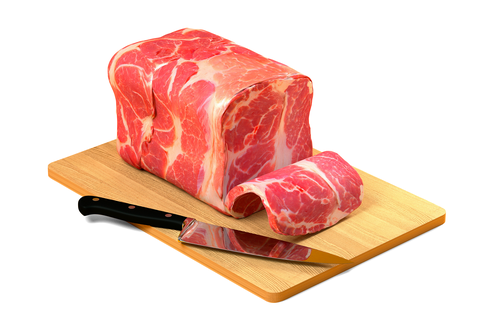
Oliver BurstonGetty Images
Irving went full meat last October and says he’s experienced mostly positive changes. He’s lost weight. He feels better when he exercises. He’s less socially anxious. But he’s also been sick with cold-like symptoms several times over the past two months and says he isn’t sure whether this new susceptibility to illness is part of the “adaptation phase” or something else.
A typical day of eating for him involves a ten-egg omelet reinforced with heavy cream plus salmon cooked in butter for breakfast and about five to six quarter-pound burger patties with cheese for dinner. (He skips lunch.) “I accept a variety of meats and organs for dinner, but it’s usually beef,” he says. Like many others on the all-meat eating regimen, Irving says he was surprised that the diet appears to be working and that he feels great overall. That said, “in the first four to five weeks of being on this diet, my GI tract had trouble processing the abundance of fat I was giving it,” he says. Beyond six weeks, however, the symptoms abated.
Still, anecdotes like Irving’s are not data. There simply isn’t rigorous, long-term scientific research on the carnivore diet yet. But with unprecedented levels of obesity and type 2 diabetes in America, skeptics wonder if the current approaches to nutrition are even the right ones to follow. Hence, all these people who eat only meat.
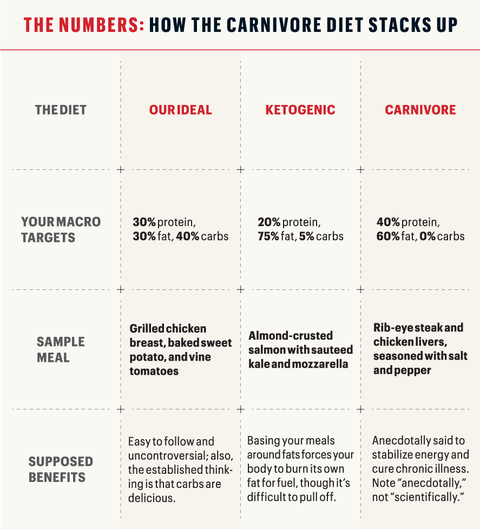
.
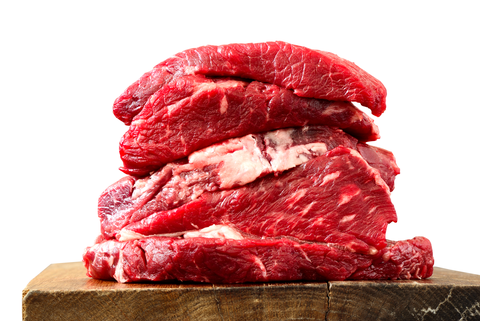
fortyforks
For example, going without fruits and vegetables would limit your intake of vitamin C, an essential nutrient your body can’t produce. Not eating enough vitamin C means that you’ll miss the nutrient’s powerful disease-fighting antioxidants, and you may put yourself at risk of scurvy.
And then there is the absence of fiber, a type of carbohydrate known for decreasing your risk of illnesses such as heart disease and cancer. Carnivores believe that by not eating any carbs, they don’t have to worry about spikes in blood sugar. But, Langer explains, “even if you’re not taking sugar in, it still doesn’t mean that your blood sugar is going to be nonexistent.” Plus, she says, “fiber nourishes gut bacteria, and we’re just learning how our gut bacteria may be responsible for everything from our immune-system status to our mood.” And anyone who has ever seen a Metamucil commercial knows that fiber helps with your regularity.
Brian St. Pierre, R.D., C.S.C.S., director of performance nutrition at Precision Nutrition, takes issue with the way the diet is being hyped. “When you think about ‘eating like a man,’ what are the connotations of that statement? It’s eating red meat, having a steak. They’re somehow attaching their eating choices to their manliness, their virility, their powerfulness.”
“The current state of muscle-building research suggests that the carnivore diet would actually be suboptimal when it comes to muscle building.”
Even if the diet is about virility, it’s far from clear that a carnivorous lifestyle actually maketh the man.
Just consider the athletes and ironmen whose diet includes plants—basically, all of them—making it hard for carnivores to claim, as some will, that their own diet is the only route to absolute physical prowess. As it turns out, they may actually have it all backward. “To think that you can’t build muscle while eating plants is a misnomer and a straw-man argument,” emphasizes St. Pierre. “The current state of muscle-building research suggests that the carnivore diet would actually be suboptimal when it comes to muscle building. Now, folks can still gain muscle mass eating this way, but on average or compared to intelligent omnivorous eating, it would likely be less effective.”
Yet carnivore-diet Reddit forums abound with glowing testimonials and photographic evidence of men who report leaning down after adopting an all-meat diet. And Baker, he’s proud to report, is very happy with his regularity.
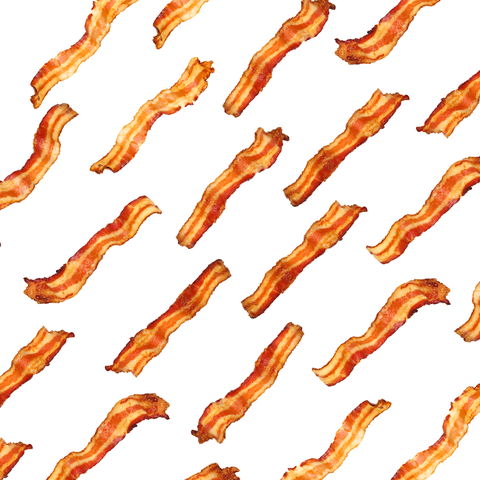
Getty Images
“It’s always important to not outright dismiss approaches,” says St. Pierre. “There can always be nuggets of validity even if there are elements that are unsavory or untrue. So yes, there could be some viability to [the carnivore diet] for some people, particularly if they suffer from GI issues that plants might aggravate. For a small subset, a very small subset of people, maybe it works. Do I think that’s broadly applicable, that the arguments made are broadly applicable to wide swaths of the population? No. I don’t think the research supports that.”
The Planetary Debate
Then there’s the environment. A much-cited report published in Nature claims that greedy Westerners must cut beef consumption by 90 percent in order to reverse climate change. If cattle rearing is destroying the planet, a lack of vitamin C may well prove to be the least of your concerns.
Regardless of how you feel about the future of the planet, you need to consider how the carnivore diet fits into our history as meat eaters. Eating only meat challenges the whole idea of what it is to be human. It suggests that humans may have taken a wrong turn with the development of agriculture. This claim has been levied against keto and paleo and contends that a diet based entirely (or almost entirely) on meat and protein bucks basic evolutionary logic.
Shawn Baker, the unofficial carnivore king, argues that given the choice between killing a nutrient- and calorie-rich mammoth that would feed a family for weeks and scrabbling around for nuts and berries, an Ice Age hunter-gatherer would invariably have chosen the mammoth. This may be true, but not all hunter-gatherers had access to meat, let alone mammoths. There’s also evidence indicating that humans were consuming grain long before the so-called agricultural revolution—like tens of thousands of years before.
“If humans had evolved to be pure meat eaters, we would have the digestive system of a carnivore, which we do not. We have the digestive system of an omnivore, someone who will eat a mixed diet.”
“When you actually look at paleolithic research, there is no such thing as a paleolithic diet,” says St. Pierre. Early humans ate what was available based on where they lived. They didn’t have the choices of modern carnivores and had to consume what they could in order to live and reproduce.
And they weren’t just eating meat. “If humans had evolved to be pure meat eaters, we would have the digestive system of a carnivore, which we do not. We have the digestive system of an omnivore, someone who will eat a mixed diet.”
There are the obvious external anatomical differences, too, including the size of your jaw muscles and, of course, the shape of your teeth. Though you have incisors meant for cutting meat, your molars are squared, designed for chewing. The molars of animal carnivores are sharply serrated compared with those of humans.
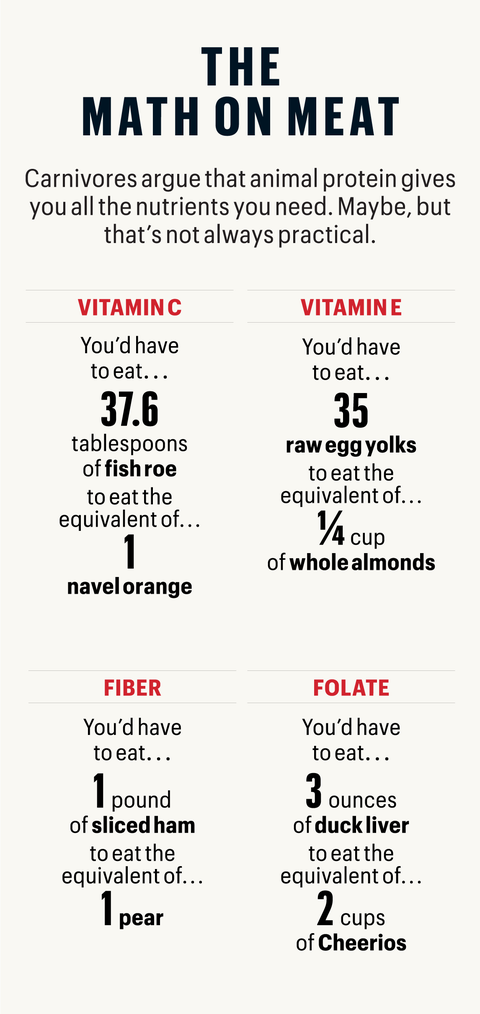
.
“Humans can exist on a wide variety of diets,” says Timothy Spector, M.D., a genetic epidemiologist at King’s College London and author of The Diet Myth. “Some have adapted to eat high-meat diets, such as the Inuit, Maasai, or Mongolian people. But most don’t tolerate it.” There is, after all, a huge chasm between low-carb and nothing but meat.
To suggest that humans somehow evolved while eating only (or even primarily) meat would be anthropologically inaccurate. To then suggest, as carnivores might, that humans somehow took a “wrong turn” along the path of evolution, well, that would be to claim something else entirely. Evolution doesn’t care about right or wrong; evolution cares about survival.
Gut Reactions
The Carnivore Diet seems to somehow defy logic and science. Even some carnivore redditors are complaining that ever since Jordan Peterson came out as a supporter, a certain “madness” has descended on what was once a quirky little community. Many of the more bizarre posts link to a YouTuber named Sv3rige, who makes videos about his experiments with feasting on raw meat and drinking pigs’ blood. Sv3rige’s channel also spouts flat-earth conspiracies.
Various carnivores suspect that the movement has been infiltrated by Russian disinformation bots. The idea that many of the more extreme carnivore-diet posts are “fake” isn’t so far-fetched: Russian trolls were discovered to have been spreading antivaccination theories in the lead-up to the 2016 presidential election. The wider aim seems to have been to undermine faith in experts and to foster division. This theory plays into a current thread of distrust in science and the government.
All the extremity is a sign of uncertain times, explains Langer: “It says that we’re getting to a point where the more extreme, the better, and that we revere things like strength and willpower.” But people are also looking for comfort, she adds. The carnivore community, like any subculture, provides a sense of belonging, of being in the right, of knowing more than the experts. “It’s become antiestablishment,” says Langer. “[Carnivores] think that plants are like a symbol of the establishment. And then they want to distance themselves from that.”

milanfotoGetty Images
One recent Reddit discussion centered on such doubts. Even if, anecdotally, many carnivores feel better, shouldn’t the reality that their diet contradicts all of the established advice give us pause? “I think doubts are a sign of healthy skepticism,” came one reply. “This goes entirely against what is currently considered healthy by the vast majority of people. . . . That said, my doubts are very small. When I was eating what my doctor told me to, I felt terrible: gut pain, bloating, low energy, brain fog, heartburn, and high blood pressure. Now I’m eating exactly the opposite, and I feel incredible. . . . I’ll never go back to eating how I used to.”
In these modern times of uncertainty, it seems that some people, fueled by frustrations that come from following the standard and falling short, are ever more willing to trust their gut.
Source: Read Full Article